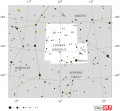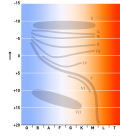An R Coronae Borealis variable (abbreviated RCB, R CrB) is an eruptive variable star that varies in luminosity in two modes, one low amplitude pulsation...
25 KB (2,015 words) - 06:17, 14 March 2025
Alpha Coronae Borealis. The yellow supergiant R Coronae Borealis is the prototype of a rare class of giant stars—the R Coronae Borealis variables—that...
54 KB (6,300 words) - 11:57, 9 May 2025
Alpha Coronae Borealis (α Coronae Borealis, abbreviated Alpha CrB, α CrB), officially named Alphecca /ælˈfɛkə/, is an eclipsing binary star in the constellation...
15 KB (1,324 words) - 19:58, 12 March 2025
the R Coronae Borealis variable of variable stars, which fade by several magnitudes at irregular intervals. R Coronae Borealis itself normally shines...
21 KB (2,234 words) - 20:28, 10 February 2025
T Coronae Borealis (T CrB), nicknamed the Blaze Star, is a binary star and a recurrent nova about 3,000 light-years (920 pc) away in the constellation...
20 KB (1,889 words) - 13:36, 11 May 2025
red and blue giant R CrB stars. R Coronae Borealis (R CrB) is the prototype star. DY Persei variables are a subclass of R CrB variables that have a periodic...
51 KB (6,578 words) - 14:46, 23 April 2025
Beta Coronae Borealis (β Coronae Borealis, abbreviated Beta CrB, β CrB) is a binary star in the constellation of Corona Borealis. It appears to the naked...
17 KB (1,514 words) - 18:40, 8 May 2025
could form a Thorne–Żytkow object with the properties of an R Coronae Borealis variable. The surface of the neutron star is very hot, with temperatures...
18 KB (1,766 words) - 20:07, 11 May 2025
Gamma Coronae Borealis, Latinized from γ Coronae Borealis, is a binary star system in the northern constellation of Corona Borealis. It is visible to...
13 KB (1,085 words) - 00:45, 23 August 2024
Tau Coronae Borealis, Latinized from τ Coronae Borealis, is a possible astrometric and spectroscopic binary star system in the northern constellation...
9 KB (678 words) - 16:04, 13 March 2025
Iota Coronae Borealis, Latinized from ι Coronae Borealis, is a binary star system in the constellation Corona Borealis. It is visible to the naked eye...
7 KB (513 words) - 20:38, 12 March 2025
V Coronae Borealis (V CrB) is a Mira-type long period variable star and carbon star in the constellation Corona Borealis. Its apparent magnitude varies...
4 KB (327 words) - 04:15, 18 November 2024
Theta Coronae Borealis, Latinized from θ Coronae Borealis, is a binary star system in the constellation Corona Borealis. It shines with a combined apparent...
8 KB (691 words) - 12:13, 14 August 2023
Delta Coronae Borealis, Latinized from δ Coronae Borealis, is a variable star in the constellation Corona Borealis. Its apparent magnitude varies regularly...
8 KB (712 words) - 17:25, 13 April 2025
faint variable star that suddenly dropped 6 magnitudes in 1992 and was identified as one of a rare class of stars—R Coronae Borealis variables. Eclipsing...
53 KB (5,858 words) - 03:29, 9 April 2025
S Coronae Borealis (S CrB) is a Mira variable star in the constellation Corona Borealis. Its apparent magnitude varies between 5.3 and 13.6, with a period...
9 KB (770 words) - 20:17, 10 February 2025
Earth. σ CrB A is the variable star TZ Coronae Borealis. Hierarchy of orbits The brightest components of Sigma Coronae Borealis form a visual binary with...
19 KB (1,623 words) - 19:12, 27 March 2025
Eta Coronae Borealis (η Coronae Borealis, η CrB) is a stellar system that lies approximately 58 light-years away. The primary component is a mid-wide binary...
12 KB (876 words) - 18:46, 8 May 2025
Mu Coronae Borealis, Latinized from μ Coronae Borealis, is a solitary, ruby-hued star located in the northern constellation of Corona Borealis. It is...
7 KB (569 words) - 15:43, 13 March 2025
after losing its hydrogen envelope in the future. Carbon star R Coronae Borealis variable Yoon, S.-C.; Langer, N. (2004). "Helium accreting CO white dwarfs...
4 KB (504 words) - 01:04, 17 May 2025
more luminous than the type II Cepheids with the same period. R Coronae Borealis variables are often yellow supergiants, but their variability is produced...
20 KB (2,525 words) - 09:50, 30 April 2025
extreme helium star, while RS Telescopii is an R Coronae Borealis variable. RR Telescopii is a cataclysmic variable that brightened as a nova to magnitude 6...
38 KB (4,054 words) - 04:40, 4 May 2025
RCB may stand for: R Coronae Borealis variable, a type of eruptive variable star Ràdio Ciutat de Badalona, Barcelona, Spain RCB Bank, Cyprus A protein...
735 bytes (112 words) - 16:17, 25 February 2025
Epsilon Coronae Borealis, Latinized from ε Coronae Borealis, is a multiple star system in the constellation Corona Borealis located around 230 light-years...
9 KB (723 words) - 20:00, 12 March 2025
Nu1 Coronae Borealis is a solitary, red-hued star located in the northern constellation of Corona Borealis. It is faintly visible to the naked eye, having...
8 KB (654 words) - 15:00, 13 March 2025
two Latin letters or a V plus a number (e.g. V399). Examples are R Coronae Borealis, YZ Ceti, V603 Aquilae. (See List of constellations for a list of...
8 KB (901 words) - 23:33, 5 March 2025
Nu2 Coronae Borealis is a solitary, orange-hued star located in the northern constellation of Corona Borealis. It is faintly visible to the naked eye...
9 KB (694 words) - 15:09, 13 March 2025
Upsilon Coronae Borealis, Latinized from υ Coronae Borealis, is a solitary star in the northern constellation of Corona Borealis. It is a white-hued star...
9 KB (755 words) - 16:21, 13 March 2025
variable star in the Perseus constellation DY Persei variable, a subclass of R Coronae Borealis variables DY Eridani, a triple star system less than 16.5 light...
2 KB (249 words) - 23:47, 18 February 2024
RS Coronae Borealis is a semiregular variable star located in the constellation Corona Borealis with a parallax of 2.93mas being a distance of 341 parsecs...
5 KB (441 words) - 20:59, 8 May 2025













